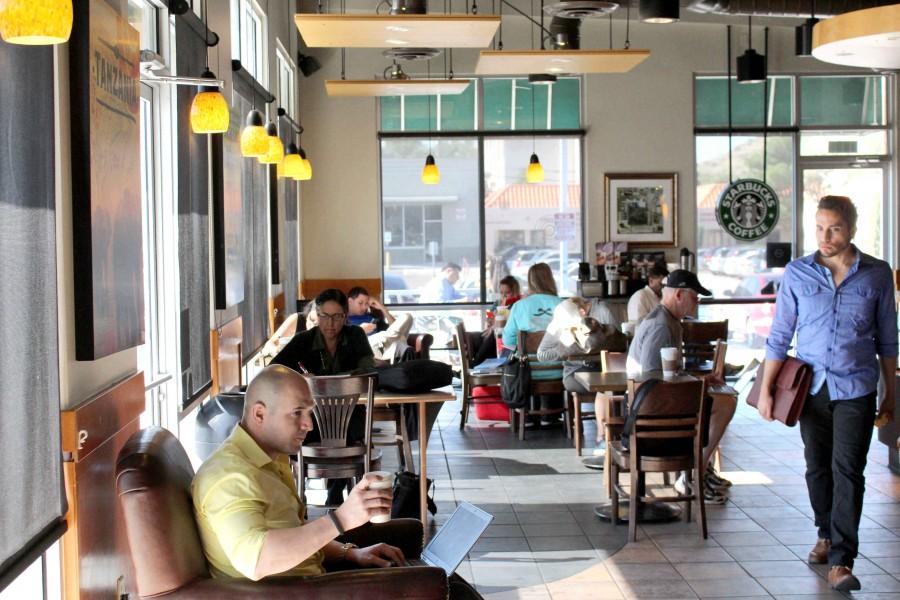It’s a typical Sunday evening at Starbucks. The coffee is brewing, students are glued to their laptop screens and Frank Sinatra’s “The Summer Wind” wafts through as they’re studying.
It’s also the time when Ryan Bustamante clocks out from work and takes a momentary break. The 20-year-old mechanical engineering major will have to gear up for another routine week.
Bustamante puts in between 25-30 hours per week at Starbucks while going to school 12 hours out of the week. Through a promotion, he receives $9.25 per hour. Between work and school, Bustamante said he might have time to go to the gym and, if he’s lucky, get seven hours of sleep.
He also said that even with his increase in salary, he does not make enough to pay for college tuition and car payments on his 2012 automobile. A student resident of Texas, who is taking 12 hours at UTEP will pay $2,884.72 plus new student fees, incidental fees, course-related fees and individual college major fees.
The struggle—a common expression in today’s pop culture—is a spot-on definition of students balancing a work and school schedule all under Texas’ minimum wage of $7.25 per hour.
In El Paso, according the U.S. Census Bureau, the average household income is $40,974, and 24 percent of the population lives below the poverty line.
According to the U.S. Census Bureau, 20.3 percent of El Paso County residents have a bachelor’s degree or higher that are over 25 years of age or older as of 2012.
Politicians are having a tough time handling the tricky situation of whether to increase minimum wage or leave it as is. At first look, it may seem like a no-brainer to increase and help the work force to make a little extra money, but it is not nearly that simple.
In 2009, the federal government raised the national minimum wage to $7.25 per hour. The two sides of the story is more money in some wallets, but less people with money in their pockets. From an employers’ perspective, needing more money to pay employees means cutting hours and job opportunities. This does not bode well for low-skilled workers.
According to a report released by the Congressional Budget Office in Feb. 2014 on projections, raising the minimum wage from $7.25 to $10 would consequentially raise the earned compensation of the workforce to $31 billion. However, the number of workers who would benefit would decline, as companies would reduce the number of workers to compensate for labor costs.
Thomas Fullerton, professor of economics, does not believe it is a good idea to raise the minimum wage.
“I see more drawbacks associated with it,” Fullerton said. “Minimum wage tends to lag behind inflation because it’s raised only at discreet intervals. It makes it hard for inexperienced workers and unskilled to be gainfully employed.”
Fullerton said he believes in government assistance for those who work and still fall below the poverty line.
“In terms of low-wage workers, rather than price them out of the labor market, a better vehicle for addressing the concern would be via the Income Tax Credit. If someone is working, but not making enough to rise out of the poverty level, then federal (government) can intervene and reward those workers with additional money as long as they are working,” Fullerton said.
Recently, Las Cruces has mandated that by 2017, all workers will be entitled to $10.10 per hour. By July 2015, rates will rise to $8 per hour and to $8.50 in January 2016.
At New Mexico State University, Chris Erickson, professor of economics, favors an increase for all workers paid minimum wage. He said raising the minimum wage would encourage more training for workers and a higher retention of employees.
“There is a tendency to hire older workers, rather than in their ‘20s than teens,” Erickson said. He also said he believes students should be studying, not working. “We are not educating our teenagers enough. Raising the minimum wage decreases teen employment.”
Erickson also said increasing minimum wage takes from consumers and business owners, and gives to low-wage workers. When deciding between winners and losers—workers, consumers, business people—the issues are not about efficiency, but about fairness, he said.
“Relying on the market assumes workers are in a position to negotiate on an equal footing with business,” Erickson said. “In the real world, very often low-wage workers aren’t in a position to negotiate equally with employers. They tend to be younger, not as well educated, perhaps suffering from physical or mental deficits. These are not people who can go toe to toe in negotiations.
Erickson said that when taking inflation into consideration, today’s minimum wage has not remained consistent.
“When talking about fairness, there is another issue at least when it comes to baby boomers like myself, which is that the minimum wage is really very low right now, especially when compared to when we were young,” Erikson said. “I earned $1.60 per hour at my first job in the early 70’s. That wage, adjusted for inflation is—guess what–$10.10 an hour today.”
Bustamante said he sympathizes with those who are forced to work and put education aside.
“Some are not capable of going to school just because of situation that happened,” he said. “Everyone is not blessed with what certain people have.”
Luis Barrio may be reached at [email protected].







